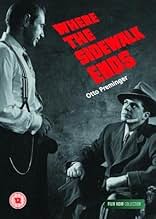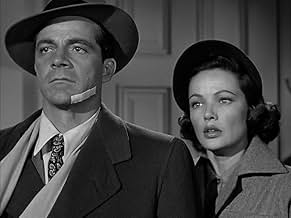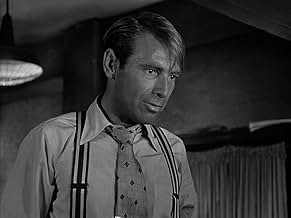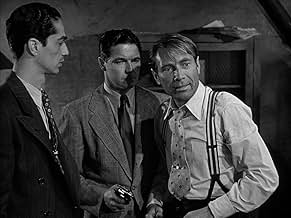NOTE IMDb
7,5/10
11 k
MA NOTE
Mark Dixon veut être quelque chose que son vieil homme n'était pas: un gars du bon côté de la loi.Mark Dixon veut être quelque chose que son vieil homme n'était pas: un gars du bon côté de la loi.Mark Dixon veut être quelque chose que son vieil homme n'était pas: un gars du bon côté de la loi.
- Réalisation
- Scénario
- Casting principal
- Récompenses
- 1 victoire au total
Fred Aldrich
- Detective at Staff Meeting
- (non crédité)
Don Appell
- Willie Bender
- (non crédité)
David Bauer
- Sid Kramer
- (non crédité)
Eddie Borden
- Pool Hall Patron
- (non crédité)
Neville Brand
- Steve
- (non crédité)
Barry Brooks
- Thug
- (non crédité)
Ralph Brooks
- Railroad Baggage Clerk
- (non crédité)
Oleg Cassini
- Oleg
- (non crédité)
John Close
- Hanson
- (non crédité)
Avis à la une
I'm a big fan of fan of film noir, and this film by Otto Preminger easily stands as one of the best that I've seen! Preminger has reunited two of his stars from the hit 'Laura' - Gene Tierney and Dana Andrews, for an entirely different sort of crime film. Laura was based around love, and this film is based around hate; as we watch police detective Mark Dixon, a copper already suffering scrutiny from his superiors for his heavy handed tactics, accidentally kill a suspect and try to pin the murder on a known criminal; a man by the name of Tommy Scalisi. The plot is brilliantly worked, and Preminger excellently balances several plot points; but it all comes back down to the main moral implication surrounding our main character. The fact that the film is set in the criminal underground means that the plot is given an excellent base to work from, and director Otto Preminger expertly captures the sleazier side of life by showing the main characters gambling, beating one another (and their women), shooting and more - and this also helps to offset the film from the earlier 'Laura', which was very much set in upper class society.
The role of Mark Dixon gives Dana Andrews one of the most interesting parts of his career. Here, we have a character that is difficult to like as he's so cold - but the fact that we can understand his motives ensures that he's easy to sympathise with, and that allows the audience the ability to plug into his plight. The character development is well timed, and as we've follows this character and his motivations throughout the film; everything makes sense by the end. His co-star is the beautiful Gene Tierney, who isn't given as much to do in this film as she was in Laura; a film that made Tierney its linchpin. She does well with what she's got, however, and the lead duo's chemistry is excellent and Tierney helps to complete every scene she's in. I can't say that this is a better film than the earlier Laura; that's a hard act to follow, but this film certainly fits into the film noir formula better than Preminger's earlier film. The film also makes a good comparison piece for Laura; as just about everything in this film is opposite to the 1944 movie, yet it's all strangely familiar. Highly recommended to all!
The role of Mark Dixon gives Dana Andrews one of the most interesting parts of his career. Here, we have a character that is difficult to like as he's so cold - but the fact that we can understand his motives ensures that he's easy to sympathise with, and that allows the audience the ability to plug into his plight. The character development is well timed, and as we've follows this character and his motivations throughout the film; everything makes sense by the end. His co-star is the beautiful Gene Tierney, who isn't given as much to do in this film as she was in Laura; a film that made Tierney its linchpin. She does well with what she's got, however, and the lead duo's chemistry is excellent and Tierney helps to complete every scene she's in. I can't say that this is a better film than the earlier Laura; that's a hard act to follow, but this film certainly fits into the film noir formula better than Preminger's earlier film. The film also makes a good comparison piece for Laura; as just about everything in this film is opposite to the 1944 movie, yet it's all strangely familiar. Highly recommended to all!
If all "film noirs" were this good, we would have a lot more of them. If someone were to ask me what is one I would tell them to go see this movie as a perfect example. This a 50 year old movie that doesn't feel old. In other words, nothing sounds corny and stupid as others of the time. Dana Andrews had a real hard edge on his shoulder much different than in The Best Years Of Our Lives. Without giving anything away, I recommend seeing this movie "cold" like I did and be thoroughly entertained.
Despite the lack of a haunting theme song and the austere and humourous presence of Clifton Webb, this film is a much more exciting experience than "Laura", the other collaboration between Preminger, Andrews and Tierney. This is one of the grimmest film noir films I've ever seen, and not just in its lurid shadows and rain-drenched streets. The film is dark to its very soul. Dana Andrews plays what is now a standard stereotype: the cop who is bitter and deadly with his temper. But Andrews plays it with more honesty and humanity than most any other angry movie cop you're likely to see. Despite the fact that his character is good at heart, he is also a criminal and a killer, and the film beautifully strings him along, forcing him to serve his spiritual penance. What of course is most fun is the way that his terror over being discovered slowly comes to a boil. I've seen tons of film noir movies but I can't recall ever seeing the protagonist ever becoming the anti-hero in such a startling way. Many of the best film noir pics have that dizzying spiral theme of a man trapped by his own weakness. "Night in the City", "Detour", "Scarlet Street", "In a Lonely Place", "Act of Violence" and "Johnny Eager", are among the best of them. "Were the Sidewalk Ends" holds its own among them. Not a bad recommendation!
Produced and directed by Otto Preminger, and starring Dana Andrews, the king of the B-movies, this is a terrific 20th-Century Fox film noir, all heavy woollen topcoats, stylish wide-brimmed hats and skewed camera angles. It's a film with a superb 'dark' look and a Ben Hecht script which delivers the authentic cadences of noirspeak.
Mark Dixon is a tough cop. His father was a small-time hood, and Dixon feels he has something to prove. He uses street methods, roughing-up bad guys and bullying stoolpigeons. He is not liked by his superiors, and has remained a detective sergeant, whereas his contemporary Lewis (Karl Malden) has played it by the book and has risen to the rank of lieutenant. Lewis is now Dixon's boss, and there is considerable tension between the two men.
Enter Ken Paine (Craig Stevens), a two-bit crook and bagman for Scalise (Guy Merrill). Tall, dark and handsome, and a much-decorated war hero, Paine is a drinker and a punk who lurks around cheap crap games. He is dating a dame by the name of Morgan Taylor (Gene Tierney), a looker with a whiff of glamour about her. Morgan is a fashion model in a Manhattan department store by day, and an 'escort' in Scalise's gambling club by night. Jiggs Taylor, her father (Tom Tulley), is a New York cabbie with a fondness for telling tall stories.
Dixon is on his last chance. The captain has made it clear - no more rough stuff. Then something dreadful happens, and Dixon panics and tries to cover it up. He sets in motion a train of events which he can't control, especially after he becomes emotionally involved with the beautiful Morgan. Dixon's tormented soul is the film's battleground, the instinct for self-preservation warring with a guilty conscience and a need to earn the girl's respect.
Though they do not spoil the movie, there are some things in the story which don't quite add up. A detective openly discusses a current investigation with a yellow cab driver, something which even the unorthodox Dixon would never do. Dishes are served to Dixon and Morgan in the restaurant, even though they didn't order anything specific. How is Morgan able to get to Paine's apartment in the couple of minutes which elapse after she hears the news? Why do the police interrogate Jiggs at the scene, in the presence of his daughter? Surely the detectives know better than to subject Jiggs to a confrontation ID without allowing him access to legal advice?
A 'noir' is nothing if not atmospheric, and this one is dripping with atmosphere. Brooklyn Bridge looms high over the mean streets, a skeletal silhouette which haunts the action like some urban angel of doom. New York City is the matrix in and through which these characters function, the context of their entire existence, and its presence is constantly felt. Whether by means of an el-train overhead, or a forest of skyscrapers swimming into focus through the locker-room window, the city surrounds and bears in upon these people, the malevolent nest through which they are obliged to scurry.
Dana Andrews is excellent as Dixon, the tough guy who retains our sympathy because he is capable of remorse. Watch out for Scalise's masseur, a very young Neville Brand.
It doesn't always help to be innocent, says Dixon, the hard man conscious of the harsh ways of the city, but the wretchedness of a guilty conscience is a terrible burden to bear. The camera conveys this beautifully, with a brooding Dixon large in the foreground as the investigation proceeds, and earlier, his horrified face twisted by a fish-eye lens as he realises the enormity of what he has done.
Verdict - A murky, grim film noir ... marvellous!
Mark Dixon is a tough cop. His father was a small-time hood, and Dixon feels he has something to prove. He uses street methods, roughing-up bad guys and bullying stoolpigeons. He is not liked by his superiors, and has remained a detective sergeant, whereas his contemporary Lewis (Karl Malden) has played it by the book and has risen to the rank of lieutenant. Lewis is now Dixon's boss, and there is considerable tension between the two men.
Enter Ken Paine (Craig Stevens), a two-bit crook and bagman for Scalise (Guy Merrill). Tall, dark and handsome, and a much-decorated war hero, Paine is a drinker and a punk who lurks around cheap crap games. He is dating a dame by the name of Morgan Taylor (Gene Tierney), a looker with a whiff of glamour about her. Morgan is a fashion model in a Manhattan department store by day, and an 'escort' in Scalise's gambling club by night. Jiggs Taylor, her father (Tom Tulley), is a New York cabbie with a fondness for telling tall stories.
Dixon is on his last chance. The captain has made it clear - no more rough stuff. Then something dreadful happens, and Dixon panics and tries to cover it up. He sets in motion a train of events which he can't control, especially after he becomes emotionally involved with the beautiful Morgan. Dixon's tormented soul is the film's battleground, the instinct for self-preservation warring with a guilty conscience and a need to earn the girl's respect.
Though they do not spoil the movie, there are some things in the story which don't quite add up. A detective openly discusses a current investigation with a yellow cab driver, something which even the unorthodox Dixon would never do. Dishes are served to Dixon and Morgan in the restaurant, even though they didn't order anything specific. How is Morgan able to get to Paine's apartment in the couple of minutes which elapse after she hears the news? Why do the police interrogate Jiggs at the scene, in the presence of his daughter? Surely the detectives know better than to subject Jiggs to a confrontation ID without allowing him access to legal advice?
A 'noir' is nothing if not atmospheric, and this one is dripping with atmosphere. Brooklyn Bridge looms high over the mean streets, a skeletal silhouette which haunts the action like some urban angel of doom. New York City is the matrix in and through which these characters function, the context of their entire existence, and its presence is constantly felt. Whether by means of an el-train overhead, or a forest of skyscrapers swimming into focus through the locker-room window, the city surrounds and bears in upon these people, the malevolent nest through which they are obliged to scurry.
Dana Andrews is excellent as Dixon, the tough guy who retains our sympathy because he is capable of remorse. Watch out for Scalise's masseur, a very young Neville Brand.
It doesn't always help to be innocent, says Dixon, the hard man conscious of the harsh ways of the city, but the wretchedness of a guilty conscience is a terrible burden to bear. The camera conveys this beautifully, with a brooding Dixon large in the foreground as the investigation proceeds, and earlier, his horrified face twisted by a fish-eye lens as he realises the enormity of what he has done.
Verdict - A murky, grim film noir ... marvellous!
Dana Andrews plays New York City police detective Mark Dixon. Dixon is in trouble with his superior because he beats up the hoods he encounters. The problem is Dixon's father was a hood himself and got the current big cheese in the underworld, Tommy Scalise (Gary Merrill), his start in crime. Mr. Merrill looks about as Italian as a Cro-Magnon man, in fact he actually resembles Cro-Magnon man, but that's another story. So Dixon really sees his much hated but long departed dad in all of these rats he collars, thus the attitude. Dixon's superior says one more complaint about his rough stuff and he's off the force.
Then a murder at a private game set up by Scalise to take an out of town hayseed. You see, the hayseed started winning - 19K to be exact - and then wanted to leave. Scalise and his mob disagreed.
When Dixon and his partner get the call, the rich Texan is lying dead with a knife in his heart, Scalise says he was losing not winning when he died, and the guy (Craig Stevens as Ken Payne) who got into a fight with him over a girl (Gene Tierney as Morgan Taylor) is long gone, as well as the girl. Dixon and his partner split up, with Dixon going to Ken's place to see what he has to say.
Now apparently all Ken did - and all the audience saw - was Ken knock the Texan cold. Ken has no idea that he has been set up to take the fall for a murder. So when Dixon shows up at Ken's place a fight breaks out when Dixon tries to arrest him. Ken throws a punch at Dixon, Dixon hit back, and Ken lands on the floor dead. Then a phone call from Dixon's partner. When asked if he found Ken, Dixon says no. The partner warns him not to get rough with the guy because, besides being a first class scum bag, he was a war hero and has a steel plate in his head due to war wounds. Thus the one punch death.
Nobody is going to believe the truth given his reputation, so Dixon has to come up with a clever plan to get rid of the body and make the timeline look like he could never have been the killer. He succeeds too well. Then he begins to fall for Ken's widow, Morgan. And Dixon did a very good job of throwing suspicion off, because it lands on Morgan's dad who is booked for Ken's murder once the body is found. So Dixon has the possibility of making the woman he loves both a widow and an orphan. How can he make this right and get to keep Morgan, or can he? Watch and find out.
Andrews' acting is subtle, mainly all facial expressions, since he can't talk out the dilemma he is in with anybody. The entire cast is superb. You've even got Karl Malden in a minor role as the new supervisor of detectives, and Tom Tully as Jiggs Taylor, Morgan's cab driving dad whose loud voice and big stories help get him into the legal jam he finds himself. That mousy little petty criminal who manages to have a small part all through the film that you've seen a hundred times in similar roles? Wrong. That was Don Appell in his only screen appearance. Finally there is Ruth Donnelly adding some great atmosphere as the hash slinging mom figure to Dixon. The only characterization that made me go "huh?" was Gene Tierney playing the daughter of a cab driver like she is a Park Avenue debutante.
I'd give it a nine if not for the ending. Darn that production code. Watch and find out what I mean.
Then a murder at a private game set up by Scalise to take an out of town hayseed. You see, the hayseed started winning - 19K to be exact - and then wanted to leave. Scalise and his mob disagreed.
When Dixon and his partner get the call, the rich Texan is lying dead with a knife in his heart, Scalise says he was losing not winning when he died, and the guy (Craig Stevens as Ken Payne) who got into a fight with him over a girl (Gene Tierney as Morgan Taylor) is long gone, as well as the girl. Dixon and his partner split up, with Dixon going to Ken's place to see what he has to say.
Now apparently all Ken did - and all the audience saw - was Ken knock the Texan cold. Ken has no idea that he has been set up to take the fall for a murder. So when Dixon shows up at Ken's place a fight breaks out when Dixon tries to arrest him. Ken throws a punch at Dixon, Dixon hit back, and Ken lands on the floor dead. Then a phone call from Dixon's partner. When asked if he found Ken, Dixon says no. The partner warns him not to get rough with the guy because, besides being a first class scum bag, he was a war hero and has a steel plate in his head due to war wounds. Thus the one punch death.
Nobody is going to believe the truth given his reputation, so Dixon has to come up with a clever plan to get rid of the body and make the timeline look like he could never have been the killer. He succeeds too well. Then he begins to fall for Ken's widow, Morgan. And Dixon did a very good job of throwing suspicion off, because it lands on Morgan's dad who is booked for Ken's murder once the body is found. So Dixon has the possibility of making the woman he loves both a widow and an orphan. How can he make this right and get to keep Morgan, or can he? Watch and find out.
Andrews' acting is subtle, mainly all facial expressions, since he can't talk out the dilemma he is in with anybody. The entire cast is superb. You've even got Karl Malden in a minor role as the new supervisor of detectives, and Tom Tully as Jiggs Taylor, Morgan's cab driving dad whose loud voice and big stories help get him into the legal jam he finds himself. That mousy little petty criminal who manages to have a small part all through the film that you've seen a hundred times in similar roles? Wrong. That was Don Appell in his only screen appearance. Finally there is Ruth Donnelly adding some great atmosphere as the hash slinging mom figure to Dixon. The only characterization that made me go "huh?" was Gene Tierney playing the daughter of a cab driver like she is a Park Avenue debutante.
I'd give it a nine if not for the ending. Darn that production code. Watch and find out what I mean.
Le saviez-vous
- AnecdotesThe only feature film appearance for fashion and costume designer Oleg Cassini, who was married to Gene Tierney at the time. They would divorce in 1952. Reportedly, Cassini talked director Otto Preminger into giving him the part.
- GaffesWhen Dixon is staging the murder scene after Ken Paine' death, he is gloveless. A few seconds later he has gloves on both hands.
- Citations
[to Detective Dixon]
Insp. Nicholas Foley: Your job is to detect criminals, not to punish them.
- Crédits fousThe opening credits start as chalk writing on a sidewalk with someone walking over them and whistling.
- ConnexionsFeatured in Gene Tierney: Final Curtain for a Noir Icon (2008)
Meilleurs choix
Connectez-vous pour évaluer et suivre la liste de favoris afin de recevoir des recommandations personnalisées
- How long is Where the Sidewalk Ends?Alimenté par Alexa
Détails
- Date de sortie
- Pays d’origine
- Langue
- Aussi connu sous le nom de
- Al borde del peligro
- Lieux de tournage
- 58 Pike Street, Manhattan, Ville de New York, New York, États-Unis(Ken Paine's apartment - between Madison and Monroe Streets - since demolished. Note Manhattan Bridge in the background)
- Société de production
- Voir plus de crédits d'entreprise sur IMDbPro
Box-office
- Budget
- 1 475 000 $US (estimé)
- Durée
- 1h 35min(95 min)
- Couleur
- Rapport de forme
- 1.37 : 1
Contribuer à cette page
Suggérer une modification ou ajouter du contenu manquant



































